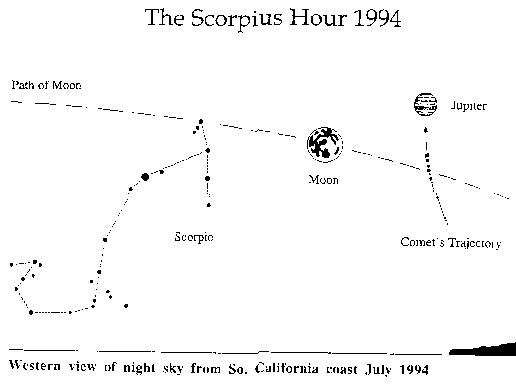

fig:1
The Scorpius Hour of 1994
by
Kris Weber Sherwood
In the Summer of 1994 an unprecedented astronomical event was witnessed taking place in our Solar system. As it progressed, a commentary on this event was manifesting itself in England’s cereal fields as a brilliant series of Crop Circle designs. Called ‘thought bubbles’ by some, their obvious reference to the awesome comet strike on Jupiter was noted at the time. The depth and elegance of their content slowly becoming clearer to me as the months passed. What I’ve extracted so far is, most probably, still only a portion of it. Seeing the ingenious subtleties of meaning that are to be found in them, has left me despairing of all that must pass each year through the blades of the combine harvesters that we, the explorers in this quest, have neither the time, the funds, or the full awareness to discover before the next years new amazements start to rivet our attention again.
In making these observations I felt I gained additional understanding of how the Circlemaking energies encode their multi-levelled, synonymous/homonymous concepts and references into the symbols that materialise in the fields. At times prophetic in content, with apparent advance knowledge of unknowable events.
fig:2b |
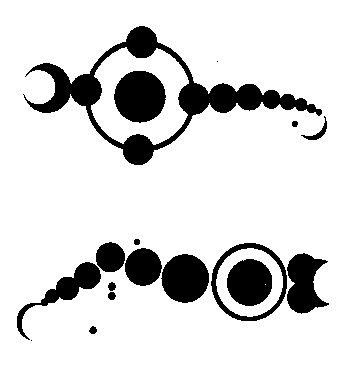 fig:2 |
The curves of graded circles repeated many times in ‘94, not only in simple strings that seemed to mirror the progression of the Jupiter collision, but also in a series of clearly "scorpion-like" designs (Fig. 2). What, I wondered, was the implied connection between the comet collision on Jupiter and scorpions? Looking at the sky charts for July of 1994 I found an stunning correlation: at this time of year the constellation of Scorpio dominates the evening sky; among astronomers it is known as the "Scorpius Hour". In the summer of 1994 as the Shoemaker-Levy 9 Comet was fatally rendezvousing with Jupiter, Jupiter’s orbit positioned it in the sky directly in line and in front of the "claws" of Scorpio. The entire constellation acting as a mammoth pointer, calling our attention to the astronomical spectacle unfolding there. The Scorpion formations doubly calling our attention to the "String of Pearls": the 21 letter-named comet fragments approaching the planet, and to Jupiter’s position in relation to Scorpio (Fig. 1). A beautiful example among the these ‘Scorpion’ designs (Fig. 2b) occurred on June 8th at Lopcombe Corner, near Salisbury. Notice how the small ‘grapeshot’ near the ‘kink’, or ‘bend’, in the tail of this formation corresponds perfectly with the large stars adjacent to the corresponding part of the actual constellation. The double circle and crescent head suggests to me a conjunction with the moon. A feature that relates it to the formations discussed in the next paragraph. In researching this information I spoke with a British astronomer who verified an interesting detail about Scorpio: from England the lower portion of Scorpio is below the horizon and this tail portion is not visible from there. This astronomer had relocated to Los Angeles where he had his first look at Scorpio’s tail.
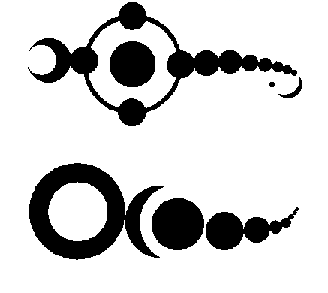
fig:3a top fig:3b bottom
The comet’s trajectory, as viewed from Earth, curved from below Jupiter to the impact site where Scorpio pointed. The "thought bubbles" all formed on hillsides in a similar orientation. Adding to this the Ecliptic, path of the moon, fell that summer exactly between the claws of Scorpio and Jupiter! Several formations in this " Comet" series illustrate the moon’s position as it passed directly between them. The earliest of these being the Silbury Hill Scorpion of May 24th (Fig.3a), that along with the later Moulsford formation of July 17 (Fig. 3b) seems to state, in part, "moon position in relation to Scorpio". The quintuplet, seen here as the scorpion’s head, is an ancient Celtic symbol signifying the lunar cycles. (A connection my husband, Ed Sherwood, has made to the meaning of Celtic crosses and their relevance in Crop Circle designs.) The Silbury Hill Scorpion formed on the night of a lunar eclipse, adding additional meaning to the inclusion of the lunar symbol. I would hazard an unverifiable guess that the formations indicating moon position, actually formed in the short time that the moon was in this position on the nights in question. The crescent "tail stinger" and moon symbols of May and June continued evolving and simplifying their images, once stated, into ‘shorthand’; condensing the designs as they progressed. Circle-string scorpions were streamlined and ‘morphed’ into the ‘comet' glyphs near and during the actual impact week. Jupiter being represented in most as the large ring.
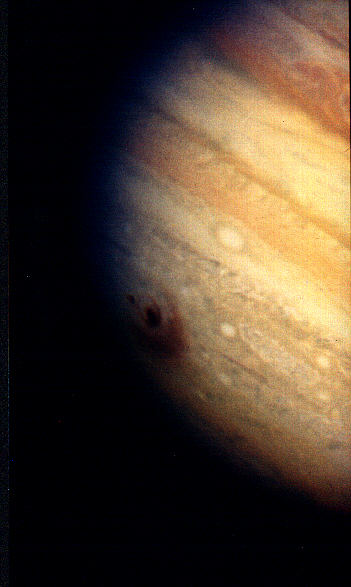
fig:4a
As the photos started to appear later that year in astronomy publications, further remarkable reflections of this event in the previous summer’s Crop Circles came to light. The large "G" fragment impact site, 48 hours after collision (Fig. 4), was a ‘dead ringer’ for the exquisite nested crescents of July 26th at Oliver’s Castle; even down to the single adjacent grapeshot, which appears as a dark spot next to the impact site! (Fig. 5) Later analysis revealed to astrophysicists that the very configuration of this fresh G-site, the way the shock waves formed, revealed that Jupiter’s atmosphere contained a previously undetected abundance of water! Water, a key element in the formation of Crop Circles, and one symbolically represented in, and found in close proximity, to many. Three months before this event, at Avebury in yellow Canola, a curiously similar image of a circle containing a crescent appeared. Was this a coincidence or a preview of coming events? In what might be a bit of the kind of cosmic humour we’ve seen the "CircleMakers" display, I noticed that the crescents at Oliver’s Castle can be seen as a ‘monogram’ containing the location’s initials: O’s & C’s!
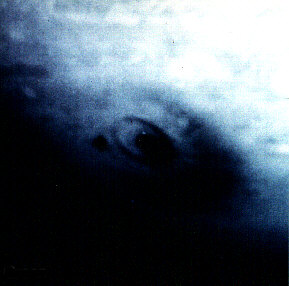
fig:4b
There were another two formations that occurred in ‘94 that I thought may be added hints for us to "get" the Scorpio inference; these were the "Claw" formation (mid July) at Hackpen Hill, which seems an amalgam of the G-site crescents, the colliding comet fragments, and a claw image to reference Scorpio; and the stylised "mechanical scorpion" of July 29 at Littleton (I have not seen a photo of but reported to be in an untramlined field), which I think is an underlining of the ‘kink’ feature of the Wiltshire Scorpions, a kink which is present in the ‘backbone’ of the actual constellation of Scorpio, and I think is intended to draw our attention to the fact that these formations indeed refer to Scorpio. I see the ‘Claw’ as a transitional design, appearing at the beginning of the actual comet impact week, with the overlapping circles of its tail visually saying ‘collision’. While drawing the diagram it occurred to me that it was only necessary to rotate a couple of the crescents in its ‘head’ and it effectively becomes the image of the Oliver’s Castle Crescents formation that was to appear nearly two weeks later.(Fig. 6)
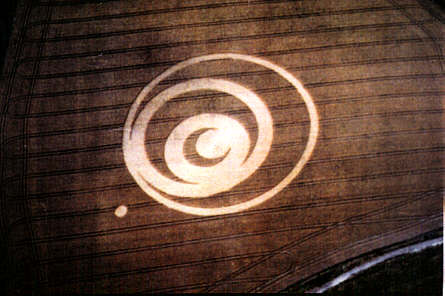
fig:5
To finish the Crop Circle year of ‘94 a final startling formation occurred that completed this chronology; implying yet another connection that wasn’t clear to me until I saw, in the Astronomy Magazine of November ‘94, the composite south pole shot of Jupiter. From the south pole, the ring of impact sites created a ring within a circle of graded circles; some of the impacts, close together, making one of the shapes appear as a ‘fat’ crescent joining the rest of the circles. (Fig.7) The final formation contrasting this image with a polarity of design, frequently found in Crop Circles that appear to be related in meaning. The ring of circles in the formation are a reverse of the photo image, with the crescent turned away from the largest circle. The positive/negative features contrasting and underlining their connectedness. Two of the "Asteroid Belt" formations from 1995 (Fig. 8) illustrate this type of polarity, in this case between: standing rings/flattened rings; ring of circles in ‘order’/ ring of circles in ‘chaos’; actual planetary orbits/stylised orbits. Compare this culminating formation called "The 13 Moons" (Fig. 9) and it’s suggested multi-levelled meanings: the thirteen moons of the Celtic as well as Native American Calendars; the end of season circles in seeming repose; the metaphorical ‘Dragon’ (of Ed’s research, and recent writings) curled again into hibernation for the winter? The ending of a cycle, a pause before recycling and beginning again? Or the ‘Scorpion/Comet’ coiled into final circular rest as a last lingering view of the bruised planet before it’s roiling atmosphere quickly smoothed the ring of impacts to a fading grey band?
fig:6 |
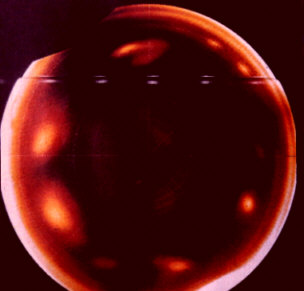 fig:7 |
We were aware this event was happening, the world’s attention was held rapt as it unfolded. Why was the ‘Circlemaking Intelligence’ diagramming it in the fields? How could it show us images from space before they happened, in some cases images that had occurred but had not yet arrived on Earth? What could account for the dozens of instances of apparent telepathic interaction between the "CircleMakers" and the thoughts of those, usually but not always, connected with the Phenomenon? What might be the source of this ingenious and pervasive intelligence? Ed’s recent work ‘Let Us Remember Dragons’ provides some additional compelling evidence toward answers to these questions.
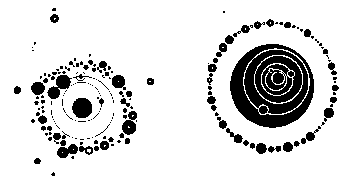
fig:8
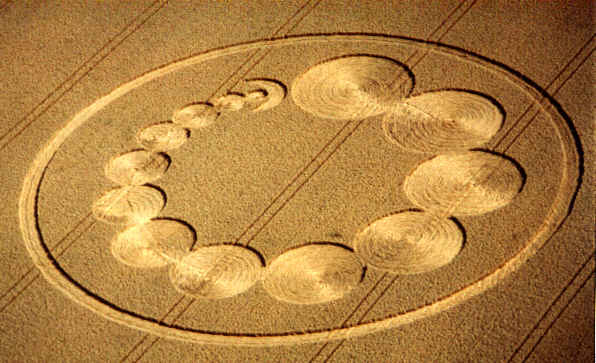
fig:9
Kris Weber Sherwood
April 1997
Postscript - Sept 1997:
My first major insight into the connection between the Crop Circle designs of 1994 and the Shoemaker-Levy 9 Comet collision came in the Fall of ‘94 when I saw the photos of the G Impact Site on Jupiter and instantly recognised it as the image of the Olivers Castle Crescent formation of July 24th ‘94. Further research uncovered the rest of what’s contained here. In July of 1997 Ed and I visited England, and on the night of July 22 in Glastonbury I first presented this information to a British audience. That night, most likely in the early hours of the 23rd, in the same field centered. on the same tramline as the ‘94 Crescents, the ‘Double Ringed Pisces’ (Fig.10) arrived. I, being a Piscean who wears two wedding bands together on my ring finger and has an initial of ‘S’, took this as resounding confirmation of this work from the Source. More on this will follow as Ed & I complete our joint article on the events ‘97.
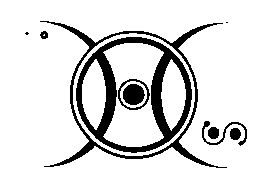
fig:10
On a very sad note: Also while in England I learned of the tragic death of Dr. Eugene Shoemaker, comet expert and this comet’s co-discoverer, in an auto accident in Alice Springs, Australia on July 18; 3 years to the week after the comet’s collision. The world has lost a vital voice in an area of research on which the very survival of the planet could one day depend.
References and Sources:
Astronomy Magazine (US) November 1994
Sky and Telescope Magazine (US) July & November 1994
‘On Jupiter’, a documentary produced by Pioneer Productions/Pinewood Studios UK
for the Discovery Channel
‘Let Us Remember Dragons’ Copyright Ed Sherwood 1997-Millennium Research
Publication
Diagrams:
Fig. 1: Scorpius Hour Illustration - Ed Sherwood
Fig. 2: Astrological Scorpio and 2 ‘Scorpion’ formations of ‘94 (2a, 2b) - Coffee
Table Book of Astrology - Viking Press 1962; Ed Sherwood: ‘2 Scorpions’
Fig. 3: Black & White diagrams of Silbury Hill Scorpion (3a), & Moulsford 7/17/94
(3b): Ed Sherwood
Fig. 6: Black & White diagram of ‘Claw’, ‘Mechanical Scorpion’,
& Olivers Castle Crescents of ‘94 - Kris Sherwood, Ed Sherwood, & Peter Sorensen
Fig. 8: Black & White Silhouette drawings of 2 Asteroid Formations of 1995: Peter Sorensen
Fig.10: Oliver’s Castle (Roundway) formation of July 23, 1997 (‘Double Ringed
Pisces’) - Ed Sherwood
Photos:
Fig. 4: ‘G’ Impact site on Jupiter - Infrared Photo (slide) July 1994 -Courtesy
of Cal Tech/ JPL Educational Services
Fig. 5: Oliver’s Castle Crescents Crop Circle formation (slide) -Copyright
Colin Andrews 1994
Fig. 7: Jupiter South Pole Composite image (slide) -Copyright Phil Nicholson & G.
Neugebauer, Palomar Observatory 1994. Courtesy of Phil Nicholson - Cornell University
Fig. 9: ‘Thirteen Moons’ Crop Circle formation -Copyright Ron Russell 1994
(Thanks also to Ron for the ‘13 Moons of the Celtic Calendar’ reference)
For more information contact:
Ed & Kris Sherwood
MILLENNIUM RESEARCH
P.O. Box 2084
Santa Monica, CA
90406-2084 USA
Tel: (310) 319-9329
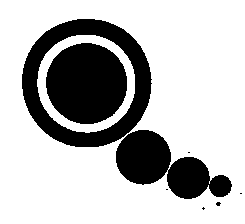
Find us on the internet @ Crop Circle Connector web site:
http://www.cropcircleconnector.com
Go to 'Links' then 'Homepages' to MILLENNIUM RESEARCH
Homepage.
E-mail @: millennium9@earthlink.net